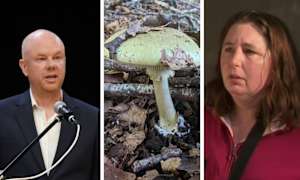HAVING epilepsy is like a “superpower” for young Jack Ashton, and his mum doesn’t want him segregated because of it.
As Gippsland Southern Health Service’s Director of Nursing at the Leongatha Campus, Kylie Ashton supports many worthwhile causes, but the Make March Purple campaign to shine the light on epilepsy is particularly close to her heart.
Kylie has shared Jack’s story to help break down the stigma around epilepsy and in the hope that more funding can be secured for potentially life-saving research.
Kylie hopes Jack’s classmates when he goes to school next year will have the opportunity to learn how to recognise and help if he has a seizure, not be shielded from learning about this part of Jack.
Jack was diagnosed with epilepsy when he was just four months old, though Kylie believes he may have had the condition even earlier. “As he got older, it just became clearer,” she said.
At the time Kylie worked in a remote Western Australia hospital and faced some early challenges in getting the right support but after consulting a paediatrician a care plan was developed.
“Being diagnosed at such a young age has meant epilepsy has been a large part of the narrative of his little life,” Kylie said.
“As Jack has gotten older, he has developed ways to let us know when a seizure is imminent, showing signs that he has some awareness that something isn’t right.”
Jack’s epilepsy requires him to take a medication known commonly as keppra twice a day, he is also prescribed emergency rescue medication in case of prolonged seizures.
The medication is working well. Jack hasn’t had a seizure since December 2022 after experiencing them every six to eight weeks prior to that.
“They were quite severe seizures, Jack would stop breathing, but the medication seems to be holding him quite solidly at the moment,” Kylie said.
There are many different types of seizure disorders. Jack is classified as having generalised seizure disorder, he experiences tonic seizures, meaning he doesn’t tremor or shake like others but has sudden tension or stiffness, stops breathing and falls to the ground.
It usually takes 1-1.5 minutes for him to start breathing again.
With her full-time work at GSHS, Kylie admits the seizures can be scary for Jack’s carers.
“The best piece of advice is to stay calm,” she said.
“Epilepsy and other seizure disorders can be quite scary for both the person having the seizure and those who are there to witness it. The main thing is to call for help, stay with them, clear the area around them, reassure them and place them in the recovery position on their side after the seizure checking that their airways are clear and they’re breathing. For Jack, anything greater than three minutes is considered a long seizure and I ask that Jack’s carers, family included, call the ambulance at this point.”
Despite the lack of seizures over the recent months, Jack remains at risk and his condition and medication are regularly reviewed.
The potential for relapses means Kylie wants Jack’s daycare, kindergarten and school friends to be aware of what to do if needed.
“Children having an epileptic fit can be segregated for safety and comfort, but if Jack has a seizure, I don’t want him to be segregated
because the kids that see him, if they know how to manage it, are going to be the ones able to save him in the play yard.
“They need to become his heroes if he has a seizure.”
Kylie said Make March Purple was important for shining a light on epilepsy and pushing for more research.
“There are a lot of great causes out there and while every cause is important, this one is particularly close to me because it relates to my family,” she said.
“It’s extremely important that we continue to raise awareness and support research into the development of new and innovative treatments and of cause strive to discover a cure.
“Research has done so much for epilepsy. There are implantable devices, changes in medication and treatment options that weren’t available 10 or 20 years ago. Without research, we wouldn’t have had those breakthroughs, but it has to keep going.”
Jack is meeting all milestones.
“He’s not at all compromised,” Kylie said.
“Epilepsy is like his superpower. There have been times when Jack has had a seizure, and we have had to consider if it was caused by the activity he was engaged in or if the timing of the seizure was unfortunate such as falling from height off a slide.
“He is the youngest of four and a real go-getter. He’s a kid you want to wrap in cotton wool, but he is also the kid won’t let you and he loves to push beyond all physical boundaries to take risks. He just goes off like a bull at a gate on the next adventure. He’s not at all risk adverse.”










